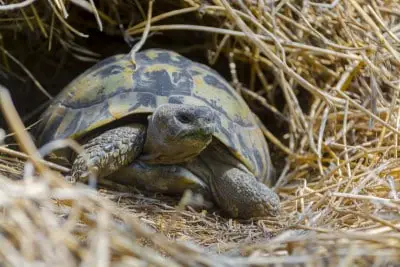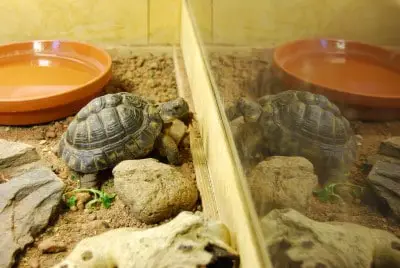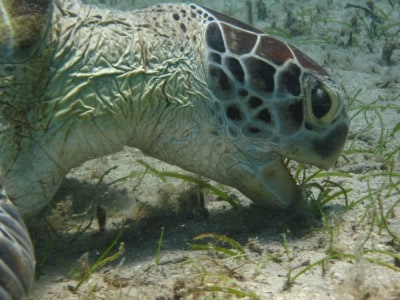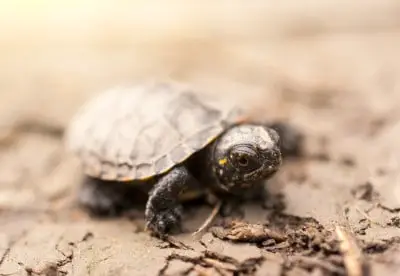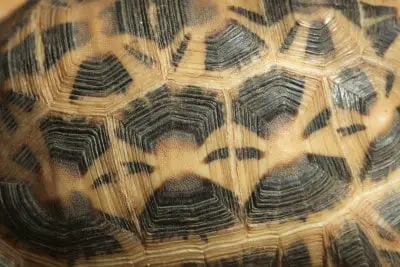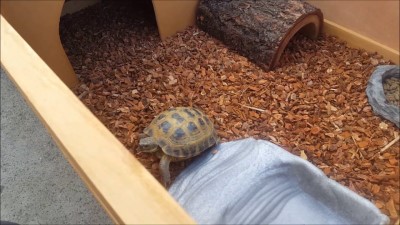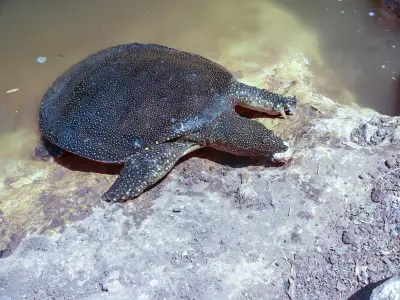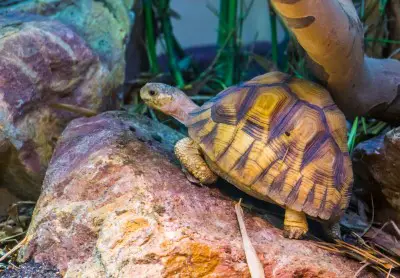Nutrition is one of the most critical factors determining the tortoise’s health and general well-being; therefore, you have to be cautious when providing their meals. Every owner’s dream for their pet is to lead a healthy and happy life, which is only achievable with the proper diet. Although tortoises have various eating habits and preferences, we intend to find out what tortoises generally eat and give you all the details regarding some common foods.
The healthiest foods for tortoises are leafy vegetables, which are sources of vitamins and other essential nutrients. Conversely, fruits mostly contain a lot of water; hence, owners should only provide them as treats and not main meals.
Considering that experts recommend no to offer your pets processed human foods or those with a lot of preservatives, you may wonder, what should you offer your pet tortoise? Read on as we have compiled 23 facts on what your tortoise should eat.
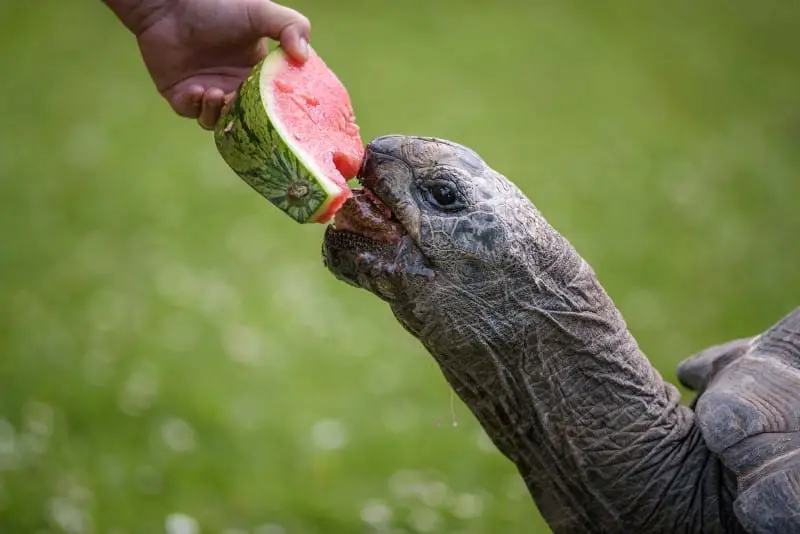
Can Tortoises Eat Cucumber?
Different tortoise foods have various nutritional and health benefits. Cucumber, for instance, is one type of vegetable that some pets passionately love. There are no side effects related to eating this vegetable, and tortoises can eat it.
However, experts state that it contains about 96% water, some vitamin C, and the rest is dietary fiber. Therefore, they can have it as an alternative water source or a tasty treat. Some owners capitalize on this and lace the cucumber with the tort’s medicine. Given that the food lacks essential nutrients, you can only feed them once in a while and in small bits.
Also, ensure that you mix it with other highly nutritious leafy vegetables. Tortoises tend to love cucumber, and it is one of their preferred treats. If your buddy loves it too much, you can add a bit of it to its daily diet and mix it to encourage it to eat more.
Secondly, your pet may love eating it when dehydrated and finds it a good option for water. You can reduce the need to eat more cucumber by offering more water and giving it frequent baths. As a result, it will rehydrate, and the demand for cucumber will significantly drop.
Can Tortoises Eat Celery?
Owners often wonder what to do with leftover celery, and the first thought is to give it to tortoises to avoid wastage. Like cucumbers, it has high water content, making it a thoughtful food if you want to help your tortoise hydrate more. Tortoises can eat celery, but only as a treat since it doesn’t contain the essential nutrients they need. Constantly and exclusively feeding them celery has its consequences.
First, your pet will be satisfied, limiting room for more meals. Hence, it won’t eat any more foods and ignore highly nutritious foods. Eventually, your tortoise will have nutrient deficiency and malnutrition, which will likely show.
Therefore, only give celery as an occasional treat and not a staple meal. Grate it and mix it with other nutritious greens, and it will be a win-win for both of you. Your tortoise will have its favorite meal and rehydrate more in the process. Also, remember to provide it when raw; overcooking it may eliminate most of the water.
Can Tortoises Eat Tomatoes?
Tomatoes are highly nutritious, but they cannot replace other leafy greens as a main meal. Tortoises can eat tomatoes. Your pet can indulge in a tomatoes’ juicy goodness as long as it is limited and combined with different food types. The reptiles find it tasty and love devouring them; however, you should not add tomatoes to their daily diet since it has its consequences.
First, your tortoise may get used to the savory flavor and decline eating other foods. Tomatoes and veggies do not taste the same; thus, your pet will likely incline to the sweeter option. The result will be an undernourished and unhealthy pet.
Tomatoes contain a lot of fiber, vitamins, potassium, and sodium. While Vitamin A is an effective antioxidant, Vitamin C helps the tortoise heal faster and absorb iron. Roughage, on the other hand, aids in metabolism and excretion. Potassium, niacin, and Vitamin B6 are also critical in facilitating cardiovascular (heart) functions. Lastly, the water in tomatoes enables the tortoise to hydrate more. When providing the tomatoes, always dice or cube it for easy consumption to give your buddy an easy time devouring it.
Can Tortoises Eat Spinach?
For all tortoise species, you can only feed them spinach occasionally, and only as a treat and not a significant part of their diet. It is a tasty leafy vegetable for your tortoise but a health hazard if consumed excessively. Some owners have no issues with providing it, while some would instead eliminate it from the diet. We recommend that you refrain from giving a lot of spinach due to the health issues involved. The vegetable has low starch content but contains Potassium, Vitamins, and water.
Additionally, it also contains oxalic acid. This natural molecule is infamous for binding two minerals like magnesium and calcium. Therefore, they can effectively hinder the critical minerals’ absorption when they get into your pet’s body. As a result, your tortoise will fail to synthesize calcium, which aids in strong bones and a healthy shell. The oxalates in excess are also liable for kidney stones in torts and, in other cases, cause skin irritation.
Can Tortoise Eat Carrots?
Vegetables cater to a significant part of the tortoise’s diet, whether in captivity or the wild. Such foods will help the tortoise keep its body lean and safe for its health, contrary to excessive proteins responsible for obesity and other related issues. Herbivorous tortoise species eat plenty of carrots; you can cut them into small pieces, grind and serve them raw. Not only is it tasty, but healthy for your pet. As soon as you realize that your tortoise loves it, you can avail it twice or thrice a week.
Sometimes, you can give them the carrot when whole by feeding them straight from your hand but be careful for its bite. Owners take advantage of this and make it a form of bonding with their pets. Carrots contain carotenoids (Vitamin A), which support vision, and minerals vital for the animal’s growth and development. Vitamins C and K also improves the immune system and acts as antioxidants by removing harmful substances from the animal’s system.
Can Tortoise Eat Broccoli?
Broccoli is a vegetable native to Italy and has been present in households for centuries. Researchers believe that it developed from wild cabbage. The vegetable has become famous, and many countries are growing it on a large scale. By extension, people find it convenient and nutritious to serve them to their pets. Although various tortoise species have different preferences and personalities, most seem to adore broccoli.
Broccoli is a healthy and tasty green vegetable that you can add to your pet’s diet and be confident that they will eat it. If it’s a bit skeptical at first, you can introduce it in small bits or mix it with different vegetables that they love for a balanced diet. Broccoli is one excellent vegetable that will not only give your companion a full stomach but will also provide minerals, vitamins, and fiber. It contains calcium, which is necessary for stronger bones and responsible for shell growth.
Broccoli also contains fibers that help in bowel movement; hence, reduce stomach problems for the animal. With more broccolis, your tortoise will have better digestion and smooth excretion. Additionally, the veggie contains vitamin A, which is responsible for night vision. This vegetable has countless health benefits, and putting in your tortoise’s diet a few times a week or a month would significantly minimize your trips to the vet.
Can Tortoise Eat Pumpkin?
Pumpkin is one of the green leafy veggies that tortoises love eating. It is safe to feed them the leaves and fruits. However, doctors advise that you provide it sparingly and cautiously since it contains a lot of proteins. Offering it every day may be fatal since excessive proteins will cause your tortoises to be obese.
Pumpkins have a lot of carbohydrates that provide the energy your tortoise needs to perform its daily activities. It can be quite tasking to keep carrying around the heavy shell, and the pumpkin will help provide required energy.
It is also a good vitamin A source, which helps it fight infections and diseases, keeping your pet strong and healthy. Pumpkin has other vitamins and minerals such as vitamin K, potassium, minerals, and manganese. The pumpkin offers excellent nutritional value to your tort, and there are no known side effects other than obesity when overeaten. However, experts believe that desert tortoises aren’t accustomed to eating pumpkin, and feeding them may cause diarrhea. Therefore, you need to be very vigilant and frequently consult your vet before providing new foods to your pet.
Can Tortoises Eat Lettuce?
Omnivorous tortoises love indulging in leafy greens like lettuce. It is rich in water and fiber, which helps in hydration and eases bowel movements. By eating such veggies, your pet will not suffer dehydration-related issues, and its metabolism will improve. However, it is best to consider other healthy alternative vegetables for your tortoise’s well-being. Although tortoises can occasionally eat lettuce, it is recommended that they do not have it exclusively since it does not contain the crucial nutrients they need.
Nutrition is the key consideration when feeding your pets. The intention is not for them to have a full belly but eat foods with nutritional value. After eating a lot of lettuce, your pet will be too full to eat any other vegetable, regardless of how healthy it is. The best types of lettuce for your tortoise include red leaf lettuce and romaine. In contrast, iceberg lettuce is the least nutritious, given its high water content.
Can Tortoises Eat Onions?
Onions are also infamous for high toxin levels, making them unfit for any animal consumption. Therefore, it is best not to give your pet tortoise any onions, whether as a primary diet or in small amounts. In bits, they are known to cause digestion problems and lead to severe illnesses when in excess. Consequently, it may be fatal for your tortoise if it eats it in excess. It contains the n-propyl disulfide, the same component present in garlic. As a result, it can cause the red blood cells to rapture.
Generally, it is critical to refrain from using bulb plants as animal feeds. Any part of an onion is highly toxic regardless of the type of onion. However, some owners argue that if onions are safe for human consumption, it is okay for tortoises to eat. The truth is, the plant may be harmless to humans but not to tortoises. One of the reasons why is that you cook it before eating, and your digestive system is stronger than the tortoise.
Can Tortoises Eat Asparagus?
As long as you provide asparagus, your tortoise will always eat it. The more you offer it, the more the reptiles will get used to it and get inclined to the taste, especially the young tortoises. Notably, some will love it, while others will hate and avoid eating it. Therefore, the love for food depends on the individual. There is no harm in tortoises eating asparagus, provided that it is in regulated amounts. It should not form an essential part of the diet since there are more highly nutritious alternative foods your tortoise should eat.
Asparagus is low on carbs and fats, making it unsuitable for bodybuilding. However, it is perfect for an energy-giving food that enables your tortoise to play and exercise. Vitamin K is also present in the vegetable and is vital in blood clotting and bone development. Secondly, it contains folates, which aid in DNA formation. Lastly, you will find fiber in asparagus to help during digestion and metabolism.
Even with all these nutritional benefits, there are some downsides to overindulging in asparagus. First, frequent feeding can lead to a diuretic effect (water loss). Your tortoise will urinate more and lose a lot of water in the process. You will have to provide more water to compensate for the lost one. It also makes the tortoise feel gassy and uncomfortable due to the high fiber content.
Can Tortoises Eat Watermelon?
Like any other fruit, watermelon contains a lot of water and sugar. Tortoises love tasty meals; therefore, it is best served as a supplement to help hydrate your tortoise. They can eat watermelon but only alongside other more nutritious meals for better health. The water keeps their skin supple, helps eliminate the toxins, and relieves them when they are constipated. This fruit is your best bet if you want your pet to hydrate more.
We recommend not feeding them daily, rather, only as a treat, since it contains substances like sugar, which interfere with the balance in their guts and create a conducive environment for parasites. However, watermelon is surprisingly richer in lycopene than tomatoes, making it a great source of vitamin c and antioxidants. It also has fiber and potassium. Remember that your tortoise is likely to get addicted to the sweet fruits, which can be disastrous if it refuses other leafy greens.
Can Tortoises Eat Bananas?
Bananas contain minerals and vitamins that are vital for the tortoises’ health but only when in small amounts. You can feed the tortoise bananas sparingly because it has sugars that can accumulate when eaten in high doses, which makes it stressful for the tortoise’s digestive system. Therefore, it is acceptable to provide the tasty bananas once within a week or month. Tortoises can eat any fruits, but it is not advisable to substitute them for other meals.
Notably, not all tortoises love the taste of bananas. Therefore, if you have never provided it, you can introduce it in bits while monitoring it. In case it likes it, you can start serving it in small amounts as a treat mixed with vegetables for a complete diet. Note that too many bananas may result in bowel problems due to excess fiber. When feeding your tort, you shouldn’t give them banana peels since they may contain chemical substances detrimental to your pet.
Can Tortoises Eat grapes?
Most tortoise species should eat approximately 80% of green leafy vegetables and 20% of whole fruits. Grape supplements to your tortoise’s diet are excellent for fruit-loving tortoises. However, it would be best if you fed it to the tortoise in smaller amounts because their digestive system isn’t strong enough to deal with a lot of starch.
Grapes are only harmful to dogs. Thus, if you live with dogs, too, it is critical to avoid leaving out the fruits where your dog can easily access them. It can be fatal for your dogs, especially without urgent medical care.
Grapes are rich in vitamin C, which is responsible for strengthening the immune system. It will ensure that the tortoise is safe from most bacteria, some of which emanate from poor hygiene in the enclosure. Grapes also contain vitamin A responsible for enhanced vision, enabling the reptiles to notice an enemy from a distance during the night. It also enhances growth and development in tortoises.
The fruit also contains 191 grams of potassium minerals. The element is crucial for the animal’s body because it checks on muscle movements, nerve functionality, conserves water in the body, and is beneficial for the animal’s kidney. Since they have a slow metabolism, tortoises need an occasional treat of grapes to maintain a healthy kidney.
Can Tortoises Eat Apples?
Like any other fruits, apples are best for use as a treat and not a staple meal. Tortoises can eat apples as a source of vitamins as long as they do not eat them occasionally. However, it would help if you were extra cautious with the apple seeds. Consider chopping the apples into chunks or slices and removing the seeds before feeding them. They are likely to cause cyanide poisoning and choking. All fruit seeds are toxic to tortoises, as much as most owners have never reported any harm to their pets.
Cyanide poisoning occurs fast and can easily lead to your tortoise’s death. On the other hand, the peels are safe, provided that they are clean and of good quality. Ensure that you thoroughly wash out the pesticides and toxins. Secondly, always provide raw fruits since cooked apples can affect your tortoise’s digestion.
Can Tortoises Eat Oranges?
Tortoises can eat oranges. While fruits should not make up the better part of your tortoise’s daily diet, you can treat the tortoise with orange once in a while since they are healthy when given in moderation. Eating it in excess may cause stomach upset to the reptile. Oranges also contain sugar that may alter the stomach pH; hence, kills the natural bacteria that assist the tortoise during digestion. You should always be keen on the amount of sugar in fruits and how frequently you feed the torts since it is paramount in maintaining their health for your pet.
Oranges contain vitamin C, which improves a defense mechanism. As a result, the tortoise can heal wounds quickly, and their body cells will be safe from diseases. Furthermore, oranges contain carotenoid, which is necessary for good eyesight and fibers to ease the animal’s bowels.
Can Tortoises Eat Pineapples?
Some tortoises love and enjoy eating pineapples, while others can’t stand the excess sugar in the fruit. In case your tortoises like pineapples, you need to give them in small amounts. Generally, desert tortoises find it hard to eat most fruits, while rainforest tortoises have no problem occasionally indulging in the sugary fruits. These tortoises often come across various fruits in their lifetime, causing them to naturally adapt and enabling their digestive systems to digest the fruits.
However sugary the pineapple may seem, it has numerous nutritional values. The fruit contains vitamin B complex, which can improve the reptile’s metabolism system. Similarly, they are soluble in water, and tortoises can expel the excess in their urine. Vitamin A is also an element found in the pineapple fruit and is responsible for eye health and fertility. Finally, the fruit has minerals such as calcium and phosphorus, which ensure solid and healthy carapace and bones.
Can Tortoises Eat Strawberries?
Experts often advise owners to avoid regularly feeding their tortoises fruits and only offer them as treats once or twice a week, but in small amounts. Strawberries, for instance, are sweet fruits that tortoises love indulging in. Your tortoise can eat strawberries, but it has to be rare and in small amounts. Excessive consumption can lead to kidney issues and diarrhea, which are fatal without urgent medical attention.
The savory taste can also influence your tortoise to incline to the particular taste and ignore any other food unless it is sweet. Such a preference can also interfere with their appetite and cause malnutrition. Fruits contain a lot of water and fiber; hence, best for hydration and metabolism. However, refrain from providing wild berries which may be lethal to the tortoises; only offer familiar fruits and consult to be sure.
Can Tortoises Eat Avocados?
Humans love the tasty avocado and use it to spruce up their meals. Sadly, this food is toxic to many animals. Leaves, roots, or flowers from the avocado plant are lethal when consumed by any animal, even the hardy tortoise. It would be best if you did not feed any avocados to your tortoise because it may be fatal.
This plant is lethal to all reptiles, and owners should not plant any avocados in their backyard to prevent their pets from accidentally eating them. There are several reported cases of birds and other animals dying immediately after consuming these fruits. The leaves, for instance, have persin that has adverse effects on animals’ health. It can cause stomach upsets, vomiting, or death to your beloved pet.
Can Tortoises Eat Rice?
Rice is a carbohydrate, and is hence an energy-giving food. Like in humans, it doesn’t provide nutritional benefits to your pet. Some tortoises may eat it, but some find it tasteless or too sticky. Tortoises can eat it since it is easy to digest, but it is not advisable to provide it regularly.
If your tortoise likes it, you can mix a spoonful in its daily meal to make it eat more. Also, remember not to give it when hot because you may hurt your pet in the process. Experts advise against pets over-eating starch since it only makes them satisfied and prevents them from eating any other nutritious alternatives.
Can Tortoises Eat Bread?
Tortoises are generally explorers, and they will gladly eat anything you provide (unless they hate the taste). Owners provide bread and get thrilled when their tortoise devours a whole slice. Notably, it doesn’t mean that your pet likes it and you need to feed it bread daily.
Tortoises should not eat bread or any other human food containing preservatives. Some chemicals are added to the foods you eat because the human digestive system is unlike the tortoise’s, enabling it to digest strong chemicals. Therefore, it will be strenuous for the tortoise to try breaking down these strong preservatives.
Secondly, bread facilitates faster growth, which is risky for the tortoise. In excess, the reptile can become overweight and too big to fit back into its shell. Consequently, your pet will have several complications related to obesity in tortoises. Another effect is pyramiding and kidney damage. It is critical for your pet’s health to avoid bread or any other human food with preservatives.
Can Tortoises Eat Egg Shells?
Omnivorous tortoises can occasionally eat eggs as it meets their nutritional needs to provide calcium and proteins. They should only eat it moderately since it contains excess proteins, which cause digestive problems. Alternatively, you can offer eggshells to them as a great source of calcium, proteins, and other nutrients.
Often, owners boil then crush them into a fine powder using a grinder; they must be well-crushed for your pet to eat and digest quickly. Hard shells can hurt the tortoise, leading to injuries that can turn fatal. Therefore, always make sure they are edible before feeding them to your tortoise.
Can Tortoises Eat Meat?
Most tortoise species do not eat meat; however, there are a handful that are omnivorous and feed on both flesh and vegetation. This fact goes against the belief that tortoises are exclusively vegetarians. Therefore, for such species, you can only give them meat treats but rarely because it may bring about digestive problems and kidney issues if in excess. A small piece of beef after a week or two is healthy for the tortoise. If you prefer chicken as the pet’s protein source, you should cook it before serving to prevent contamination.
Tortoises need proteins in limited amounts for growth, improved health, and energy. The amount of proteins that a tortoise can obtain from vegetation is very minimal; hence, may push for the need to supplement the tortoise’s diet with another protein source. Tortoises can sometimes starve themselves when sick or go for days without eating, leading to depleted energy. Proteins come in handy during dire situations like shortages to break down to offer strength to keep the tortoise active and energized.
Can Tortoises Eat Grass?
Tortoises feed entirely on grass, especially in the wild. Additionally, they also forage for various green leafy vegetation and flowers. For those in captivity, it is advisable to graze them once in a while when you can, as it is crucial for their health. However, if you cannot take them out to feed on grass, you can opt to buy and feed it to them. Always introduce it gradually, since individual tortoises may have their reservations.
Grasses contain vitamins, minerals, and fibers, all the significant elements that the tortoise needs. They also have substantial amounts of proteins, helpful for growth and development. Besides, grass contains vitamin E, which supports the immune system and acts as an antioxidant; hence, it can remove toxic substances from the animal’s system.
Wrap Up
Diet is the first thing that every tortoise parent needs to get right. You can never go wrong with leafy greens since they provide the necessary nutrients. On the other hand, fruits are savory foods that are primarily rich in water and can only be occasional treats. You also need to avoid processed human foods with preservatives and no nutritional value for the tortoise.

